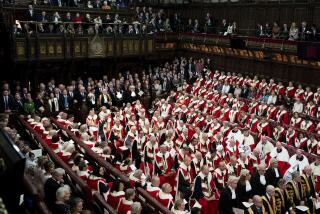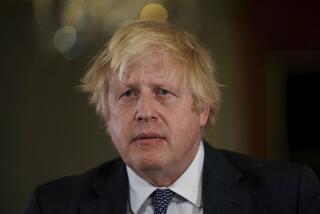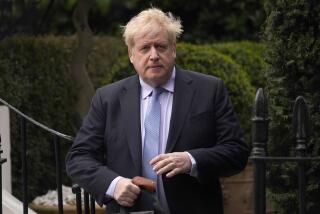Psst ... wanna be a lord?
- Share via
‘I GOT FED UP with all the sex and sleaze ... of rock ‘n’ roll,” Tony Blair said before he was elected, “so I went into politics.” Yet today he stands accused of bringing sleaze closer to the center of British democracy than any leader since the dawn of universal suffrage.
Last Friday, for the second time in three months, Blair was interrogated at 10 Downing Street by police investigating a scandal that is fast growing to resemble Watergate. The controversy began last March when healthcare entrepreneur Chai Patel was denied a seat in Britain’s unelected upper house of Parliament, the House of Lords. Days later, news broke that Patel, who had been nominated by Blair, also had loaned the prime minister’s Labor Party 1.5 million pounds -- almost $3 million -- to fund its 2005 election campaign.
In the days that followed, it emerged that Blair had nominated three more party benefactors to seats in the House of Lords. Opponents accused the party of selling nominations. Scotland Yard opened an investigation, and last month an aide to Blair was arrested, as was a top Labor Party fundraiser earlier this week. Nobody has been charged, but the taint of corruption is hanging over Downing Street like heavy fog.
Blair, who has already announced that he will leave office this year, now seems almost certain to spend his final months in disgrace, his efforts to drive policy submerged beneath a rising tide of sleaze. Some colleagues are urging him to resign before Labor’s electoral prospects are damaged irretrievably. But whenever he goes, Blair will have ample opportunity to reflect on the root cause of his disgrace: his failure to thoroughly reform the bizarre anachronism that is the House of Lords.
Britain’s upper house, which scrutinizes and revises laws passed by the elected House of Commons, plays a valuable constitutional role. It can block and delay government legislation, and it serves as the country’s Supreme Court. But it is scarcely more democratic than North Korea’s National Defense Council. Its membership of 732 lords consists of party appointees, Church of England bishops and hereditary aristocrats. No British voter elects any of them.
For as long as party leaders have been entitled to nominate them, there have been suspicions that the nominations can be bought; similar allegations badly damaged the reputation of Prime Minister David Lloyd George in the second decade of the 20th century. Prestige and power appeal to the rich, and it is not astonishing that some would want to use their money to acquire both. But no truly democratic system of government can afford to allow such a thing.
Labor came to power in 1997 determined not to. It embarked on reform of the upper house by stripping some hereditary aristocrats of seats their families had filled for centuries. Then it stopped, in part because Blair was reluctant to give the House of Lords a democratic legitimacy it might use to challenge the will of the elected House of Commons. The perverse consequence of this stalled and partial reform has been to give the prime minster unprecedented power to appoint new lords to replace the ones he expelled.
This fresh opportunity to acquire power by pleasing the prime minister has created a new temptation in British public life. Most party donors have the sense and subtlety not to demand nomination to the House of Lords in return for their money, but the suspicion is that Blair’s ambitious party fundraisers have not always waited to be asked.
Conscious of the allure of a seat in the House of Lords, they have dangled the prospect of membership before the eyes of ambitious donors. There is a thin line between promising elevation and merely hinting that it may ensue. As long as lords are appointed rather than elected, that line will be crossed by people determined to fill campaign coffers.
Britain’s Constitution is not fit for the 21st century, and it is Blair who must take the rap. Labor members of Parliament are incensed by the suspicion that he has traded access to power like a medieval potentate. For the British public, the knowledge that police have questioned their prime minister in a corruption inquiry is a national disgrace.
We Brits think we know a thing or two about democratic principles, but this conjures memories of that helicopter lifting President Nixon from the White House lawn.
More to Read
Sign up for Essential California
The most important California stories and recommendations in your inbox every morning.
You may occasionally receive promotional content from the Los Angeles Times.













